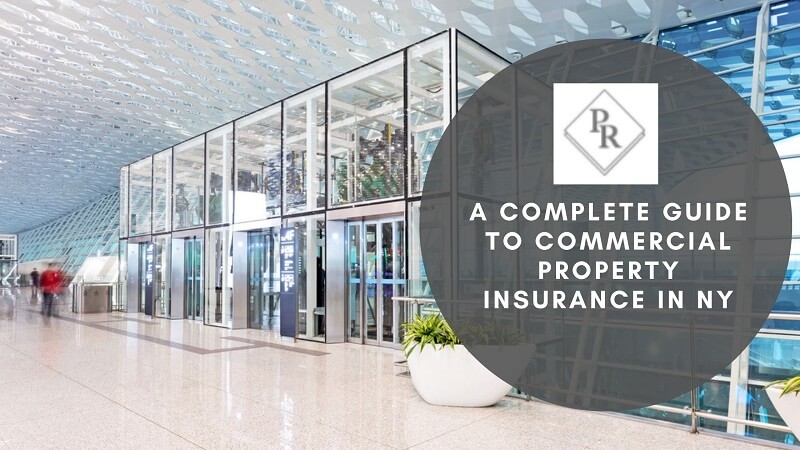One of the main types of business insurance for companies that own real estate is commercial property insurance. You need this insurance to protect your investment from natural disasters, theft, and burglary. Use this commercial property insurance guide to help gain a better understanding of this coverage.
What Is Commercial Property Insurance?
A business that owns commercial property needs insurance coverage to pay for damages or losses that might occur to the property. Commercial property insurance can be broken into the following three levels of coverage that protects against stated perils:
- Basic form policies – This limited coverage pays for damage caused by fire, severe storms, explosions, vandalism, and other disasters.
- Broad form policies – You get broader coverage with these plans that cover disasters such as damage from falling objects and leaking appliances.
- Special form policies – As the most extensive insurance package for commercial property, this coverage pays for all causes of loss or damage except those listed as “exclusions.”
Factors to be Considered
You’ll need to carefully read your policy to know what it covers since each insurance provider crafts its own plans. Be aware that standard plans only cover so much, whereas a more customized plan that fits your commercial interests provides the best financial protection of your assets.
Some policies provide replacement cost coverage, while others reimburse you with actual cash value. The former plan gives you potentially more cash value from a claim because it’s not based on your property’s worth when it was destroyed. Replacement cost coverage pays to replace the structure and its contents regardless of depreciation value.
Possible Extensions
To fill coverage gaps, you can add various extensions called endorsements to your basic commercial property insurance plan. A basic plan, for example, might not cover all types of flooding. One of the popular options for commercial property owners is buying flood insurance through the National Flood Insurance Program.
The climate in your region will influence what type of endorsements you choose to add to your policy. If you live in an environment that is prone to severe windstorms, you’ll need windstorm and hail coverage. The more severe the potential damage, the more expensive the coverage will be every month.
Even though your basic commercial property policy already covers theft, it might not cover all types of theft, such as employee theft. However, you can buy crime coverage for protection against various crimes such as forgery.
Another endorsement you should consider is inland marine coverage, which protects items stored on land instead of a boat or ship. It covers various business assets such as computers, fine art, equipment, and valuable documents.
Other Coverages You Might Need
- Business interruption coverage – If something causes your business to shut down for a while, this coverage pays for lost income.
- Extra expense coverage – After a peril damages your property, this coverage pays whatever extra costs are necessary to restore your property.
- New construction – If you invest in the construction of a new building, you can include this coverage in your policy. Your policy will likely require you to add the new structure to your plan within 30 days after construction begins or you acquire the property.
- Ordinance or law coverage – This coverage pays the costs necessary for new or old construction to meet current building codes.
- Machinery coverage – If you run several machines on your property, you’ll need this coverage for a wide range of equipment. It covers kitchen equipment, electric water heaters, HVAC systems, and more.
Shopping for Commercial Property Insurance
The more you look at different insurance quotes, the more you’ll get a sense of what your options are for commercial property coverage. Here are some insights that can help you get the precise coverage you need:
- Avoid firms unlicensed in your state – You don’t want to get mixed up with unlicensed insurance agencies because it could mean not getting paid when you file a claim. Also, beware of fly-by-night operations that promise amazing low prices to lure in unsuspecting customers.
- Compare prices and policies – Get different quotes and determine which policy gives you the most coverage for the most affordable price.
- Discuss different properties with your agent – If you own multiple commercial properties, find out from your insurer if you can bundle all the plans together under one policy.
- If your application is rejected, move on – There are plenty of insurance companies to choose from. Just because one company won’t provide coverage doesn’t mean others won’t as well.
- Think about factors beyond price – Don’t just focus on price because sometimes the best deal is more reflective of a policy’s coverage features. It’s advantageous to ensure all your valuable assets have some type of financial safety net. That’s the true value of insurance.
Additionally, you should become familiar with the insurance provider you choose before signing up with them. In other words, do sufficient research to determine the company is legitimate, licensed in your state, and has a positive public reputation. You can check on the firm’s complaint history by visiting the Better Business Bureau’s website.
Save Money on Insurance with Premier Risk, LLC
For any questions about commercial property insurance, contact our experts at Premier Risk, LLC today. We’ll match your insurance needs with the right coverage and give you a competitive quote.










